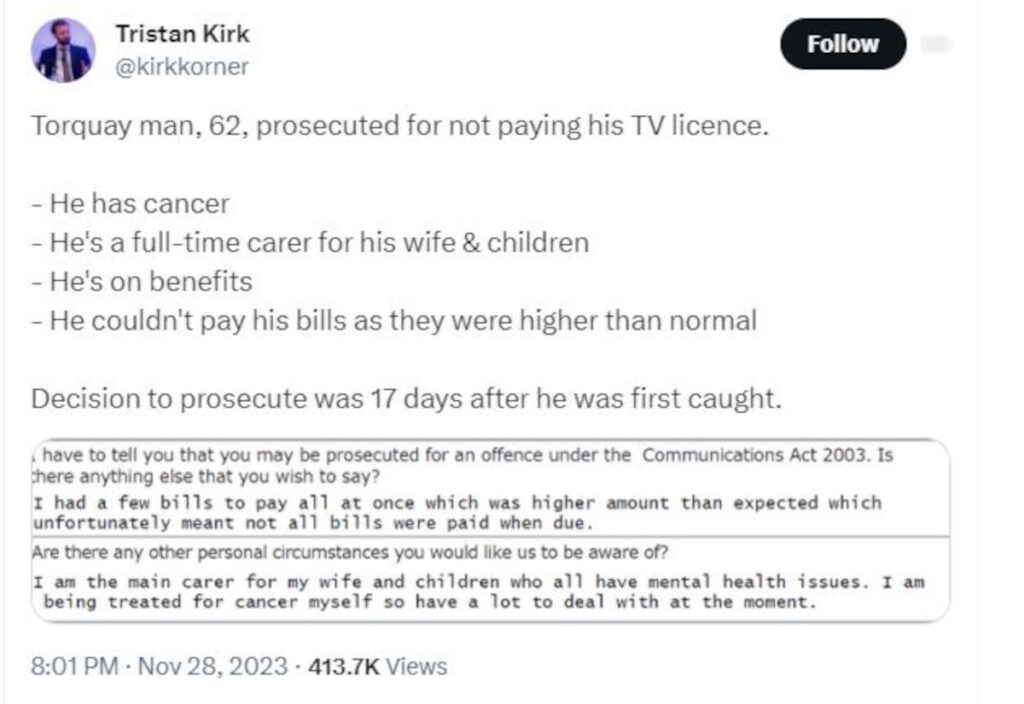BRITS have been left horrified after a cancer-stricken carer overrun with bills was prosecuted for the sake of £84 after failing to pay for his TV license.
The anonymous man’s case was revealed via the Evening Standard’s court correspondent Tristan Kirk, who told of how the 62-year-old had been unable to pay his bills as they were “higher than expected”.
The man from Torquay, Devon allegedly told of how he has cancer and is currently on benefits as a full-time carer for his wife and children.

After tuning in to watch Match of the Day though, the down-on-his-luck Brit was hauled into court where he was handed an £84 fine – and a criminal conviction.
One question posed to the man upon his appearance in court read: “I have to tell you that you may be prosecuted for an offence under the Communications Act 2003.
“Is there anything else that you wish to say?”
The man replied: “I had a few bills to pay all at once which was [a] higher amount than expected which unfortunately meant not all bills were paid when [they were] due.”
A follow-up question then asked the man: “Are there any other personal circumstances you would like us to be aware of?”
The man then heartbreakingly revealed: “I am the main carer of my wife and children who all have mental health issues.
“I am being treated for cancer myself so have a lot to deal with at the moment.”
Despite his explanation and circumstances, Tristan Kirk revealed that the TV Licensing didn’t offer an out-of-court disposal, despite its previous comment that court is a “last resort”.
Instead, the man was charged – with his fine, costs and surcharge totalling £84 – and given a criminal conviction.
Tristan shared the case to social media last Tuesday with the caption: “Torquay man, 62, prosecuted for not paying his TV licence.
“He has cancer, he’s a full-time carer for his wife and children, he’s on benefits [and] he couldn’t pay his bills as they were higher than normal.
“Decision to prosecute was 17 days after he was first caught.”
The post has since racked up over 2,400 likes and more than 105 comments from disgusted Brits who rushed to the man’s defence.
One user wrote: “Can I pay the fine? And then can we all get together to campaign against this immoral licence fee?
“The BBC is the preserve of the liberal left – the libertarians need to join together to break it. The majority no longer want it.”
Another added: “It is a shame these people are being penalised for being honest and incriminating themselves when the TV Licensing are behaving so deplorably.
“My understanding is they have no right of entry. People would best not to engage with them at all and shut the door.”
A third said: “Disgusting. Any further details on this man, I’m willing to pay his fine, surcharge, costs and TV license for him.”
Another replied: “Once again, TV Licensing being terrifyingly heavy-handed with people experiencing poverty and ill health. And yet the richest tax-evaders escape scot-free.”
A fifth commented: “Tristan, is there any way we can help these people? This is not on.”
However, this is not the first time something like this has happened as a 69-year-old pensioner from Blyth was prosecuted when his TV Licence expired whilst he was in hospital.
The man was given an out-of-court disposal, but TV Licensing said he didn’t take it up.
He was convicted and ordered to pay a £48 fine.
He said: “Unfortunately I was [in] hospital for long periods of time and I was paying fortnightly on the card at the shop, and I couldn’t get there to pay it, so this is how I became unlicensed.”
He added: “The TV man was aware and could see I was not in [good] health, I’ve just came out hospital after 11 weeks stay again after having surgery and diagnosed with heart failure, kidney problems, oedema problems, breathing problems [and] limited mobility.”
A TV Licensing spokesperson today said: “TV Licensing’s primary aim is to help people stay licensed and avoid prosecution – which is always a last resort.
“We are doing all we can to help people and offer a range of concessions and payment schemes which support people who fall into financial difficulty.
“If it is necessary to consider prosecution we apply evidential and public interest tests.
“We will review evidence received at any stage in the process if it shows that it would not be in the public interest to prosecute, and this includes severe financial difficulty.”

